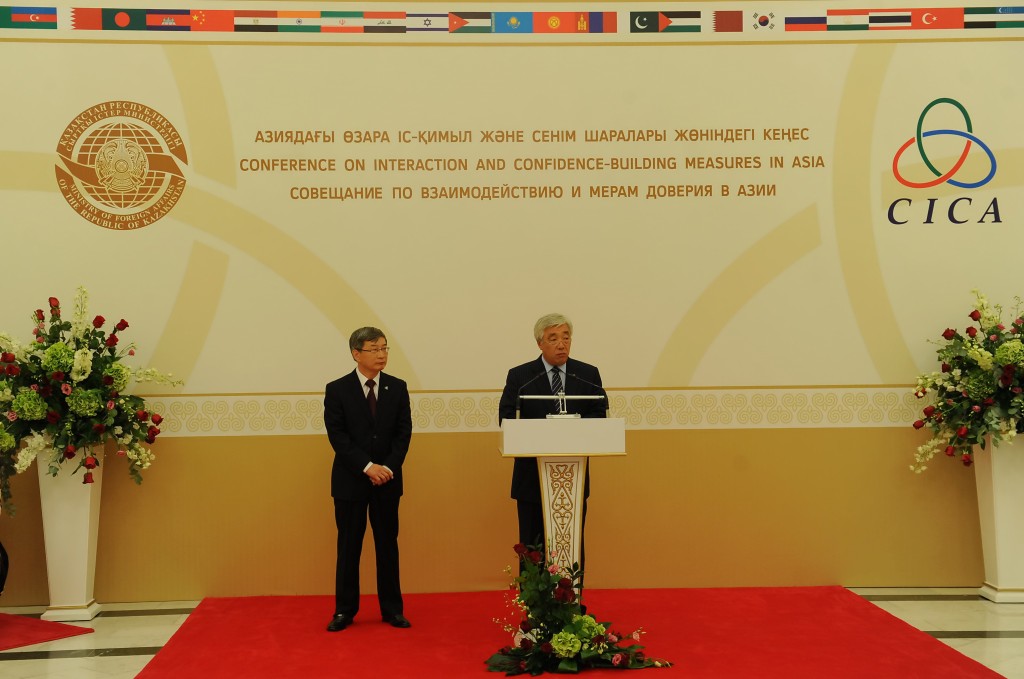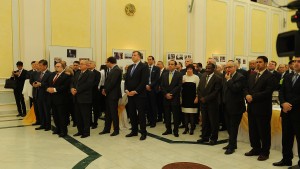ASTANA – Voicing support for the new Asian security concept proposed by China, Kazakh Foreign Minister Erlan Idrissov called for more contact between members, more organisational institutions and other measures to strengthen the Conference on Interaction and Confidence-Building in Asia (CICA) at an event marking CICA Day on Oct. 6.

Kazakh Foreign Minister Erlan Idrissov adresses the audience at an event to mark the 22nd anniversary of the Conference on Interaction and Confidence-Building Measures in Asia (CICA) at the Ministry of Foreign Affairs in Astana on Oct. 6, 2014, as the current head of the CICA secretariat, Chinese Ambassador Gong Jianwei looks on.
The concept, outlined by Chinese President Xi Jinping at the CICA summit in Beijing in May, proposes a comprehensive regional security framework for Asia, rather than the current network of individual military alliances with external allies, often the United States. Instead, Xi called on Asians to solve Asian problems.
Addressing the audience of ambassadors, members of Kazakhstan’s parliament, representatives of international organisations and other invited guests at Kazakhstan’s Foreign Ministry on Oct. 6, Idrissov said the new security concept was based on “a common, comprehensive, cooperative and sustainable regional security,” and expressed the hope that the new concept would clear a path for CICA’s consolidation and transformation into an Organisation for Security and Development in Asia.
Idrissov recalled the early history of the CICA, including the date when President Nursultan Nazarbayev first voiced the idea of convening such a forum at the 47th session of the UN General Assembly in New York on Oct. 5, 1992. Contrasting the “scepticism” that surrounded the idea at the very beginning with the more recent developments in the process, he said the fourth CICA summit in Shanghai in May 2014 brought together leaders and representatives of 47 states and international organisations. Overall, the CICA has 26 member states in Asia from Israel and Iran to China, India and Pakistan, plus seven countries and four international organisations as observers.
There needs to be coherence and coordination between the CICA and existing security arrangements, the Kazakh foreign minister stressed, referring to the multitude of security alliances and issues present in Asia. At that, peace and security in Asia can be achieved through practical steps on five themes, Idrissov continued, quoting the five areas of the CICA focus: military-political, economic, environmental, human and the fight against new threats and challenges.

The audience at the Oct. 6 event included foreign ambassadors, members of Kazakhstan’s Parliament, officials and experts.
Regarding military and political cooperation, the foreign minister said, “We propose to increase the frequency of contacts among member states on different levels by establishing a decision-making body in Astana where regular meetings can take place. There is a need to provide sufficient conference services and assist states in the implementation of CICA decisions and measures. We need to boost the executive function of the secretariat by creating a support unit. We want to create institutions and bodies focusing on specific topics within the framework of the CICA.”
The CICA can also facilitate increased economic cooperation, Idrissov continued. Chinese President Xi Jinping’s idea of reviving the Silk Road that traditionally connected China with Europe and beyond will benefit the region, but will require cooperation in the development of transport infrastructure. Declining food supplies in Asia, another concern, could also be helped by concrete CICA mechanisms related to food production, Idrissov said.
He also encouraged CICA member states to use Kazakh President Nursultan Nazarbayev’s G-Global platform as a tool for seeking solutions to economic and other problems.
Economic growth is generating an urgent need for energy and modern technology. “By the year 2020, energy imports to Asian countries will reach 80 percent,” Idrissov told the audience. Kazakhstan is determined to be a proactive energy provider while also developing alternative energy resources and environmentally friendlier technologies, he said. He invited CICA member states to take an active part in EXPO 2017 in Astana and its dialogue on future energy.
Discussing ongoing world conflicts, Idrissov said that Kazakhstan supports international efforts to hold talks on ending the violence in Syria and again called for all sides of the Ukraine crisis to engage in direct dialogue to end the bloodshed permanently. He welcomed the conclusion of the presidential election in Afghanistan but said the political situation in that country remained a potential security threat and source of instability.
The CICA will grow stronger and take on more responsibility as its membership grows and members meet more regularly. “Ultimately, we believe that the process of CICA’s transformation will bring us to establishing a new institution … the Organisation for Security and Development in Asia,” Idrissov said.
The secretariat of the organisation is currently being relocated from Almaty to Astana. In his own remarks at the event, the current head of the secretariat, Chinese Ambassador Gong Jianwei praised Kazakhstan for its continued support for the initiative and said he was looking forward to further cooperation and expansion of CICA activities.
